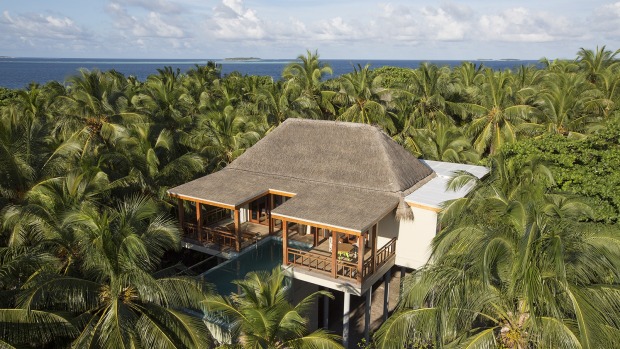
"Welcome home." These are the first words I hear as I step ashore at Amilla Fushi, which is strange because it's my first time in the Maldives and the resort had opened only a few months earlier, in March last year. Perhaps the waiter handing me my welcome drink – a deliciously sweet concoction of coconut water flavoured with cinnamon and star anise – has me confused with another guest.
But I find this is part of the ethos that infuses Amilla Fushi, which means "my island home" in Dhivehi, the official language of the Maldives.
"There are 112 resorts in the Maldives. Our mission is to be a little different," says Mark Hehir, the Australian chief executive officer of The Small Maldives Island Co, which conceived and manages Amilla.
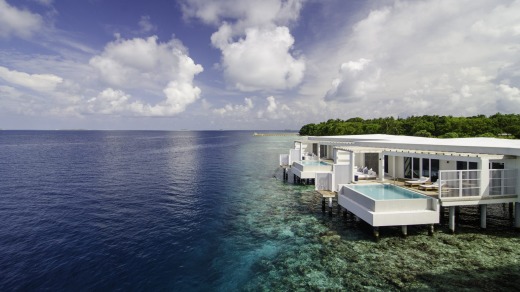
"We want the resort to be less hotel-like and to have a more residential vibe, to give guests an emotional connection so they feel this is their island home away from home."
That explains why the 67 contemporary-style villas are called houses (and room service is "home delivery"). There are beach houses, over-water reef houses, two-storey beachfront "residences" with four to eight bedrooms each, even treehouses, the first in the Maldives.
I've stayed in a few treehouses, but as I climb the timber stairs to my two-bedroom apartment on 12-metre concrete stilts, this one strikes me as less Swiss Family Robinson and more War of the Worlds. It's impressive just from an engineering perspective: 220 square metres plus plunge pool and timber deck at palm-tree height, floating in a sea of greenery.
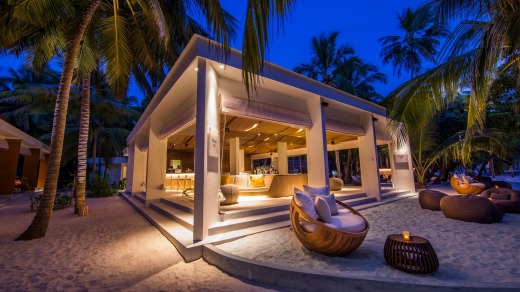
Inside, it's fashionably kitted out like a high-end holiday house at Byron Bay, with a few innovative touches. An iPad mini allows guests to explore the resort's offerings, make dinner and spa reservations, read newspapers and magazines from around the world, and check flight details and the weather. (The novelty wears off when I forget to put the iPad back on its charging station and it dies, leaving me without so much as a resort map to refer to.)
In addition to the inevitable pod coffee maker, there's a tea machine with pods of jasmine, Earl Grey and English Breakfast leaf teas. It's nice to see Australian-made Aesop toiletries in the bathrooms, in large pump bottles to reduce plastic waste. Other thoughtful touches are sunscreen and insect repellent in the minibar and a USB charging port in my bedhead.
It's all very Steve Jobs, right down to the T-shirted staff wearing surfboard-shaped wooden pendants instead of name tags – including Mujay, my "katheeb" (literally "island chief", but it means butler here).
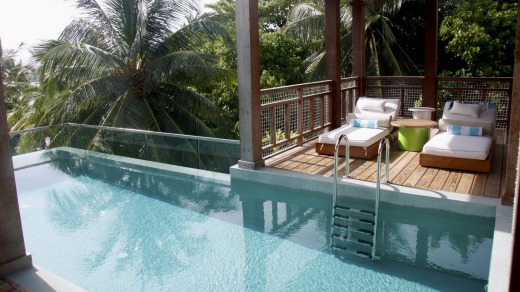
Amilla even has its own time zone. Since October it has been two hours ahead of Male, the capital, not just one hour like some other resorts. All the better to stay up late, sleep in the next morning, lounge by the pool (one of the largest in the Maldives, at 62 metres), have a full day of aquatic activities – and still make it to sunset drinks.
That's another difference between Amilla and other Maldivian resorts: the focus is not on romance and a castaway experience but on getting together with friends or in family groups for great food and good times.
To this end, there are several resort restaurants – each relaxed and unfussy (many have sand floors for barefoot dining) and also equipped with iPad minis (printed menus are so five seconds ago).
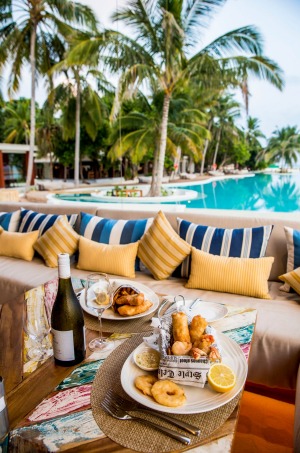
There's the Fish & Chip Shop (another Maldivian first), Baazaar Bar (the spelling is a reference to Amilla's location in Baa Atoll, a UNESCO biosphere reserve), Wok, Grill, Joe's Pizza and Fresh. There's a gourmet deli, gelateria and cafe called Emperor General Store, and a Wine Shop that operates as a cellar door.
Then there's Lonu by Luke Mangan at the far end of the jetty (lonu means salt in Dhivehi, in keeping with Mangan's Salt restaurants). Open to the sea breeze that swings the lampshades and lapping waves that provide the soundtrack, it has an open kitchen to encourage interaction between the chefs and diners. Upstairs is the open-air Sunset Bar, one of the best spots on the island for a cocktail when the Indian Ocean slips out of its turquoise daywear to mirror the evening sky's pinks and mauves.
Of course, Amilla's marine environment is another drawcard. The resort is 10 minutes by speedboat from manta ray and whale shark hot spot Hanifaru Bay, for one thing, and has world-class diving at its doorstep, run by scuba operator Dive Butler International.
Even at the spa, there's a sense of place: the airy reception area is right on the beach, there's an over-sea yoga deck, the 10 couples treatment "pods" are scattered around an enormous banyan tree and the sand-floored tea lounge "chill out zone" is just metres from the water.
But wait, there's more. The Small Maldives Island Co will open a second property, Finolhu, in June, and four more within three years, each with its own vibe and for different budgets. Boats will shuttle between them so guests will be able to, say, dine on one island and charge it to their villas on another.
Too soon, it's time to leave – in style. The pilot of our Trans Maldivian Airways seaplane might be wearing shorts and thongs, but his pressed white shirt and Aviator sunglasses are all business. As the twin props whir to life and the staff waving goodbye from the pontoon shrink from view, I see the bigger picture: Amilla and its sister-resorts are raising the bar for resorts all over the Maldives, whose gem-like atolls may never be the same again.
See visitmaldives.com/en
Singapore Airlines flies from Sydney to Male via Singapore with same-day connections daily .
Amilla Fushi is 30 minutes by seaplane from Male . Or take a short domestic flight to nearby Dharavandhoo Island and a 10-minute speedboat transfer to Amilla Fushi.
Houses start at $1760 a night including breakfast and Wi-Fi. See amilla.mv.